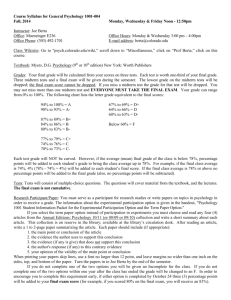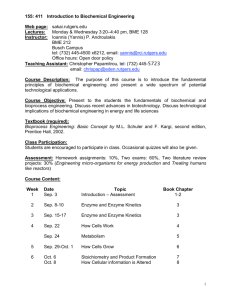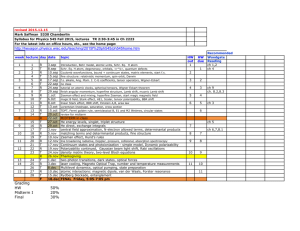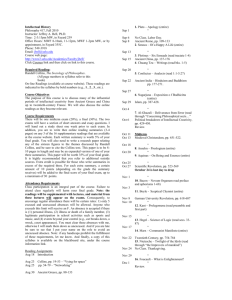Psychology 305 (Theories of Personality)
advertisement
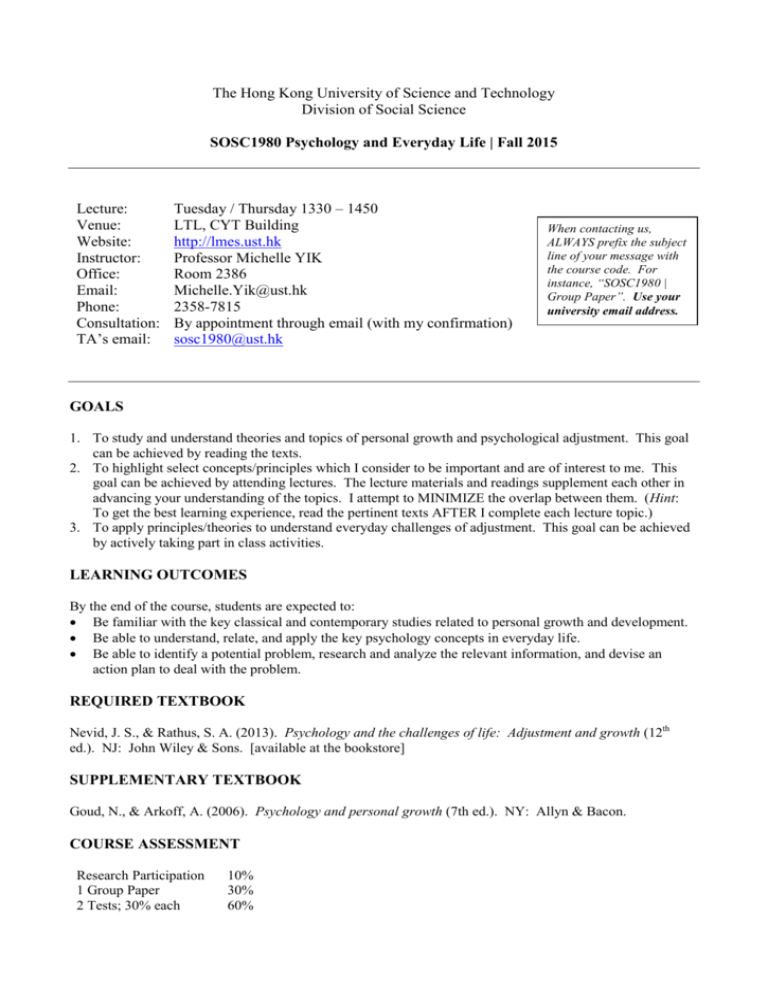
The Hong Kong University of Science and Technology Division of Social Science SOSC1980 Psychology and Everyday Life | Fall 2015 Lecture: Venue: Website: Instructor: Office: Email: Phone: Consultation: TA’s email: Tuesday / Thursday 1330 – 1450 LTL, CYT Building http://lmes.ust.hk Professor Michelle YIK Room 2386 Michelle.Yik@ust.hk 2358-7815 By appointment through email (with my confirmation) sosc1980@ust.hk When contacting us, ALWAYS prefix the subject line of your message with the course code. For instance, “SOSC1980 | Group Paper”. Use your university email address. GOALS 1. To study and understand theories and topics of personal growth and psychological adjustment. This goal can be achieved by reading the texts. 2. To highlight select concepts/principles which I consider to be important and are of interest to me. This goal can be achieved by attending lectures. The lecture materials and readings supplement each other in advancing your understanding of the topics. I attempt to MINIMIZE the overlap between them. (Hint: To get the best learning experience, read the pertinent texts AFTER I complete each lecture topic.) 3. To apply principles/theories to understand everyday challenges of adjustment. This goal can be achieved by actively taking part in class activities. LEARNING OUTCOMES By the end of the course, students are expected to: Be familiar with the key classical and contemporary studies related to personal growth and development. Be able to understand, relate, and apply the key psychology concepts in everyday life. Be able to identify a potential problem, research and analyze the relevant information, and devise an action plan to deal with the problem. REQUIRED TEXTBOOK Nevid, J. S., & Rathus, S. A. (2013). Psychology and the challenges of life: Adjustment and growth (12th ed.). NJ: John Wiley & Sons. [available at the bookstore] SUPPLEMENTARY TEXTBOOK Goud, N., & Arkoff, A. (2006). Psychology and personal growth (7th ed.). NY: Allyn & Bacon. COURSE ASSESSMENT Research Participation 1 Group Paper 2 Tests; 30% each 10% 30% 60% Research Participation You will have an opportunity to be a participant in research studies. To earn 10%, you need to participate in 3 credits of research studies. Studies vary in length. Some last 30 minutes, others an hour. You earn 1 credit of research participation for every 30 minutes of participation. Please be assured that your responses in these studies will be kept strictly confidential and used for research purpose only. Before each study, your informed consent will be sought. After each study, you will be fully debriefed, through which you will learn why and how the study is conducted. Please be reminded that for those who have taken SOSC1960 the term before or are taking it concurrently, you still need to fulfil the 3 credits of research participation for this course. Please be aware that you may be prohibited from some research studies because you have participated in them before (either for another course or for cash incentive). If you do not wish to participate in any research study or you have not completed 3 credits of research studies by the due date, you will be offered to take part in some in-person research exercises (30 minutes each) as a substitute to get the research credits. Please consult the guidelines on LMES, and refer to the Important Dates box below for the deadline. 1 Group Paper Two students will submit ONE paper. You will be randomly assigned to a group mate after the add/drop period. In this paper, each group is to argue for a stance or view point of your own choice in an assigned topic with the support of research findings. You will be provided several short articles with some guidelines to help jump start your thinking in the topic. You may choose to use or modify one or more of the ideas provided; alternatively, you are most welcome to develop your own theme. In either case, you are writing an argumentative essay using psychology-related evidence. Do not write a summary of the articles. Use the working template on LMES to organize your paper. Word limit: No more than 1,200 words, including in-text citation but excluding end-of-paper references and appendix. Please label your document using LASTNAME_Firstname_SID_.docx (e.g., CHAN_Tony_01234567.docx). We will use a web-based software turnitin http://www.turnitin.com/ to check the originality of submitted work. You may submit a more updated version of your essay any time before the deadline. When you do so, make sure you remove the unwanted file, and click the “Resubmit” button. This procedure will ensure that your final version be graded. If more than one file is submitted, we will randomly pick one to grade. Submission: Submit your paper in MS WORD format via http://lmes.ust.hk (under the “Assignments” tab). Please refer to the Important Dates box below for the due date. 2 Tests Multiple choice questions only. Tests are noncumulative. Each one-hour test covers four topics and is worth 30%. In each test, you are responsible for all materials covered in lectures and required readings. Be sure to arrive on time for each test since no additional time will be given to students who arrive late. Important Note: Introductory classes of this size add certain constraints on the way in which I must teach the course. One such constraint is that there will be NO make-up tests in this course. This means that if you miss a test, you will simply lose the number of points associated with it. Your grade will therefore be computed as if that particular entry was a zero. The only exception to this rule is a validated medical excuse. Such excuses must be in the form of a written note from your doctor, attesting to the fact that on the day of the test you are too ill to attend the test. All medical notes must be personally presented to me as soon as you are able to return to class for a make-up test to be scheduled. This means that if you are planning a love affair, divorce, or a dream vacation, you had better schedule these events so that they do not conflict with your test schedule. All make-up tests consist of long questions and an oral session. 2|P age Lecture Schedule Week Date Topic Required Optional 1 Sep 1 Sep 3 Sep 8 Sep 10 Introduction Public Holiday Introduction Introduction Chapter 1 Chapter 13 2 The Dynamics of Adjustment 3 4 5 6 7 Sep 15 Sep 17 Sep 22 Sep 24 Sep 29 Oct 1 Oct 6 Oct 8 Oct 13 Oct 15 Emotion Emotion Emotion Briefing on Group Paper Everyday Coping Everyday Coping Public Holiday Everyday Coping Personality Personality Personality Chapter 3 Chapter 4 Chapter 9 Chapter 5 Chapter 2 The Interpersonal Realm 8 9 10 11 Oct 20 The Self Chapter 6 Oct 22 Test 1 – “Introduction” to “Personality” | Venue: Classroom Oct 27 Oct 29 Nov 3 Nov 5 Nov 10 Nov 12 The Self The Self Romantic Love Romantic Love Romantic Love Romantic Love Chapters 10, 11 Developmental Transitions 12 13 Nov 17 Nov 19 Nov 24 Nov 26 Gender & Behavior Gender & Behavior Psychology of Work Psychology of Work Chapter 12 Chapter 14 Fall Term Examinations: Dec 8 – 19 | Test 2 – “The Self” to “Psychology of Work” Note. Both required and optional readings come from Nevid & Rathus (2013). On LMES, I provide several fun-to-read articles for each topic. Important Dates Date Sep 22 Oct 22 Nov 2 Nov 6 Nov 9 - 20 TBD Task Briefing on group paper Test 1 Last day of group paper consultation (11am) Group paper due by 11am Last day of research participation In-person research exercises Test 2 3|P age



